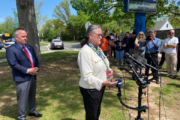This article was republished with permission from WTOP’s news partner InsideNoVa.com. Sign up for InsideNoVa.com’s free email subscription today.
The Prince William Board of County Supervisors on Tuesday all but finalized a tax increase on data centers and homeowners, per the board’s advertised rates.
The board is slated to formally adopt the budget April 22 during its 7 p.m. meeting, at which residents can still voice their thoughts on the various proposals therein. The 2026 fiscal year begins July 1.
During Tuesday’s budget markup session and through numerous straw polls, the board:
-
Set its fiscal 2026 computer and peripherals tax rate – especially pertinent for data centers – at $4.15, up from the fiscal 2025 rate of $3.70, anticipated to generate $18 million in additional data center tax revenue, according to David Sinclair, county budget director.
-
Lowered the vehicles personal property tax rate from $3.70 to $3.50, for an average decrease of $22.16 per tax bill and a $13.2 million revenue loss. At this rate, the average bill for a car will be approximately $325.70 – while the average bill at $3.50 for a truck or SUV will be approximately $449.67, according to Nikki Brown, a county spokesperson.
-
Lowered the food and beverage – or “meals” – tax rate from 4% to 3%, leading to a $5.75 reduction in revenue.
-
Lowered the real estate tax rate from $0.92 to $0.906 per $100 of assessed value – as County Executive Christopher Shorter proposed last week due to higher property assessments – which still entails a $273 (5.6%) annual increase for the average county household.
-
Maintained the fire levy at $0.072, increasing the average residential levy by $22.
Board Chair Deshundra Jefferson said the average homeowner would see a “modest” and “incremental” monthly tax increase of $22.75 – amid the yearly spike of $273 – with higher-valued homes most heavily impacted. In a text message to InsideNoVa, she added “many homeowners won’t see a meaningful change in their property tax bill.”
The meals tax, meanwhile, is an ordinance – meaning county staff must return to the board next week with specific resolutions to facilitate the implementation of the new 3% tax on Jan. 1, 2026, for the second half of fiscal 2026 and the subsequent entirety of fiscal 2027.
As for the real estate tax, supervisors debated it extensively throughout Tuesday’s meeting. A proposed reduction to $0.885 ultimately failed in a 4-4 tie via straw poll – with Potomac Supervisor Andrea Bailey, Occoquan Supervisor Kenny A. Boddye, Woodbridge Supervisor Margaret Angela Franklin and Jefferson, all Democrats, casting the four dissenting votes.
At the $0.906 negotiated real estate rate – on which the board eventually compromised – the board was still facing a budget shortfall of $406,000, its share of the remaining $950,000 shortfall given school transfer of 57.3% under the county’s revenue-sharing agreement.
The board also selected “Option Two” for its new landfill hours from a set of four choices, with the second option including 65 hours of service per week, including a planned Sunday opening and extended Thursday hours.
In order to establish a balanced five-year fiscal plan – as mandated by the county’s adopted Principles of Sound Financial Management – that could carry over from fiscal 2026 into fiscal 2030, the board was forced to make several cuts from County Executive Christopher Shorter’s proposed iteration of the budget to compensate for the shortfall. Chief among them were:
- A $300,000 reduction from county insurance premiums, leading to a $500,000 increase instead of the budgeted $800,000.
- A decrease of the county’s contingency fund from $2 million to $1.5 million.
- A $349,000 cut from Occoquan Trail maintenance.
- A level rate of funding at $2.5 million for the Parks and Recreation Department despite a budgeted doubling to $5 million.
Differing ‘values’
From the outset, Jefferson made clear the budget would be “a statement of our values” and emphasized her top two priorities would be education and public safety.
This became especially apparent when Democratic Neabsco Supervisor Victor S. Angry proposed lowering the fire levy from $0.072 to $0.0684 to trigger potential tax cuts, which would have entailed a $4 million spending removal from county fire and rescue.
Fire and Rescue Chief Thomas LaBelle told the board he would need to consult with his department on the impact of the proposed $4 million loss.
Republican Coles District Supervisor Yesli Vega weighed in, asking Angry to meet her halfway for the real estate tax in exchange for fire levy support. Jefferson responded, saying she couldn’t allow public safety to be “hijacked” for a tax rate. The proposed fire levy change narrowly failed by a 4-4 straw poll vote.
Other points of controversy involved the county’s revenue-sharing agreement with the School Board, which Vega proposed to decrease from 57.3% to 56%. A straw poll resulted in a 5-3 vote against the change, with Brentsville Supervisor Tom Gordy, Gainesville Supervisor Bob Weir and Vega, all Republicans, voting in favor.
Gordy, Weir and Vega lamented the revenue-sharing agreement’s “hamstringing” of both the board and the school division, with Weir adding the board’s new tax scheme was “disgraceful.”
In a Wednesday afternoon email to Brentsville District residents, Gordy said he “fully supports” county schools but could not endorse allocating $20 million more to the division than was requested – as the board opted to do.
“One of my colleagues on the board said this budget represents our values,” Gordy said in the email. “I assure you it does not represent my values. If it did, we wouldn’t be taking more money from you than is necessary.”
From the dais, Jefferson said she was “a heck no on this one” in relation to the proposed revenue-sharing shift, adding the agreement lends the budget “certainty.”
County positions
Earlier in the day, Amy Ashworth, Prince William County’s commonwealth’s attorney, presented her fiscal 2026 budget requests, which included eight new full-time equivalent positions, or FTEs – four attorneys and four administrative staff, all already included in Shorter’s proposed budget.
While several supervisors attempted to cut those positions late Tuesday night, the ensuing motion for a reduction to only two attorneys and two paralegals ultimately failed by a 5-3 straw poll vote – with Gordy, Vega and Weir voting in favor – as the board fully funded the eight proposed positions.
A need that the board was not able to fully address during the meeting was the county’s ongoing lack of planners. Rather than funding new planners, the board voted 5-3 to split the two planners built into the proposed budget between the “long-range” and “current” sections of the Planning Department.
A county employee homeownership program and arts council grants were also among initiatives not added to the budget.






